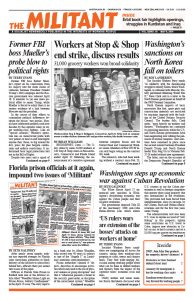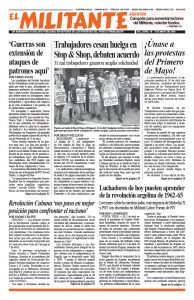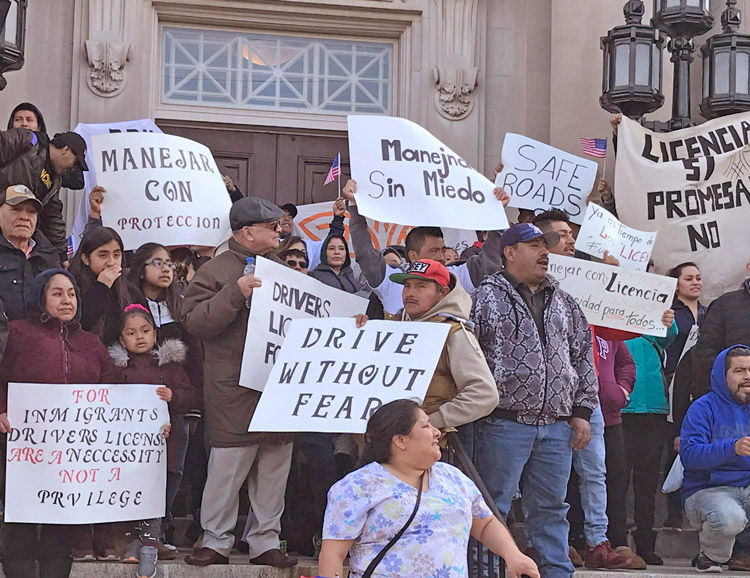“Our country is full,” President Donald Trump told Fox News April 5. He was trying to justify new obstacles the White House is pressing on the right of asylum for those fleeing violence and other moves aimed at discouraging immigrants without papers from crossing into the U.S. There’s no room here, he claimed, “so turn around.”
But the U.S. is class divided; there is no such thing as “our” country. Every president acts to advance the interests of the capitalist rulers on the backs of working people. Working people have our own class interests, and we need to fight for them.
Some of Trump’s liberal critics — including Democratic Party presidential candidate Beto O’Rourke — counter the White House by calling for an open border with Mexico.
Neither side in this debate among capitalist politicians defends the interests of working people. The Socialist Workers Party demands amnesty for the 11 million undocumented workers here and an end to raids and deportations. But the demand to “open the borders” is utopian and would lead to a crisis for working people on both sides of the border.
A million immigrants arrive in the United States every year, most with “papers,” many without. This is nothing new. It goes up and down, depending on the needs of the capitalist class, not on the existence of a border fence or wall. About 40% come from Asia and about 20% from Mexico and Central America.
In their drive for profits capitalist bosses in the U.S. and other imperialist countries superexploit working people in less developed countries. They buy up raw materials and agricultural products at low prices and sell back finished goods at high prices. They set up mines, mills and factories paying workers a pittance.
Banks based in the imperialist countries loan these nations’ governments money at high interest rates, breeding debt and sucking up even more of their resources.
As a result, the crisis that we know so well in the U.S. — farmers being driven off the land, wages too low to take care of your family, factory closings and deaths on the job — is exacerbated in Latin America and the so-called Third World.
In Honduras, for example, thugs paid by big landowners terrorize and murder peasants demanding land to farm. Criminal gangs fight for control of the drug trade and extort workers and small proprietors.
International solidarity
Working people from Latin America to China to Africa face the same challenge we face here — the need to break with the parties and politics of the capitalist class, and to organize an independent movement to struggle to take control of their own destinies.
In Honduras last year thousands of workers on Chiquita’s banana plantations went on strike, demanding better pay and work conditions. We need to see ourselves as part of an international class, and together with our unions fight shoulder to shoulder with our fellow workers in Honduras and elsewhere against capitalist exploitation and plunder.
In the absence of a fighting workers’ movement and of a revolutionary leadership that points the road to taking power out of the hands of their own capitalist class, many workers and farmers decide their only hope is to try their luck up north.
Today, instead of organizing solidarity and aid to workers’ and peasants’ fights across Central America, some liberals and middle-class radicals promote “caravans” to march on the U.S. border. This undermines the fight for the rights of refugees and for amnesty.
The capitalist bosses need immigrant workers, with papers and without. They use a calculated measure of deportations to generate fear and to intimidate undocumented workers so they don’t complain about wages and conditions and don’t join unions.
Under capitalism workers compete against each other for jobs. The bosses seek to get immigrant and native-born workers to see each other as enemies, to fight among ourselves, while they push down the value of our labor power. That’s why they scapegoat immigrants, telling U.S.-born workers that immigrants are “taking” our jobs. And they tell immigrants that U.S.-born workers “don’t want to work.”
Need proof that the capitalists don’t really believe there are too many immigrants? Under the Trump administration, so-called guest worker visas for farmworkers has reached a new high — nearly a quarter of a million. But the big agribusinesses still complain they don’t have enough workers. They can’t do without immigrant workers.
Immigrants strengthen working class
The integration of immigrants into the U.S. working class has made our class stronger. Among the best examples were the massive demonstrations in 2006 that culminated on May 1 that year, when more than a million workers went on strike. They shut down factories across the nation to protest a law that would have made it a felony just to be in the U.S. without a visa. They set an example for the entire working class.
Immigrant and U.S.-born workers work in the same factories, live in the same neighborhoods, with children that go to the same schools, and we all face the same attacks from the bosses and their government. These common experiences are why there is less anti-immigrant sentiment among working people in the U.S. today. But under the pressure of low wages and the carnage we face from capitalism’s crisis, rightist anti-immigrant demagogy gets a hearing.
And as Socialist Workers Party leader Mary-Alice Waters points out in Is Socialist Revolution in the US Possible? “Any sharp economic crisis will intensify the battle for the political soul of the working class on this and other questions.”
This is a life-and-death question for the labor movement and the working class.
The only way to rebuild a fighting union movement is to reach out to our fellow workers without papers and say, “Wherever you were born, whether or not you have ‘papers,’ whatever language you speak or your skin color, let’s join together to fight to change the miserable conditions that capitalism imposes on us.”
Immigrant and native-born workers will join as the gravediggers who will bury capitalism once and for all.
Join this year’s May Day protests to demand: Amnesty for the 11 million undocumented workers in the U.S. now!


